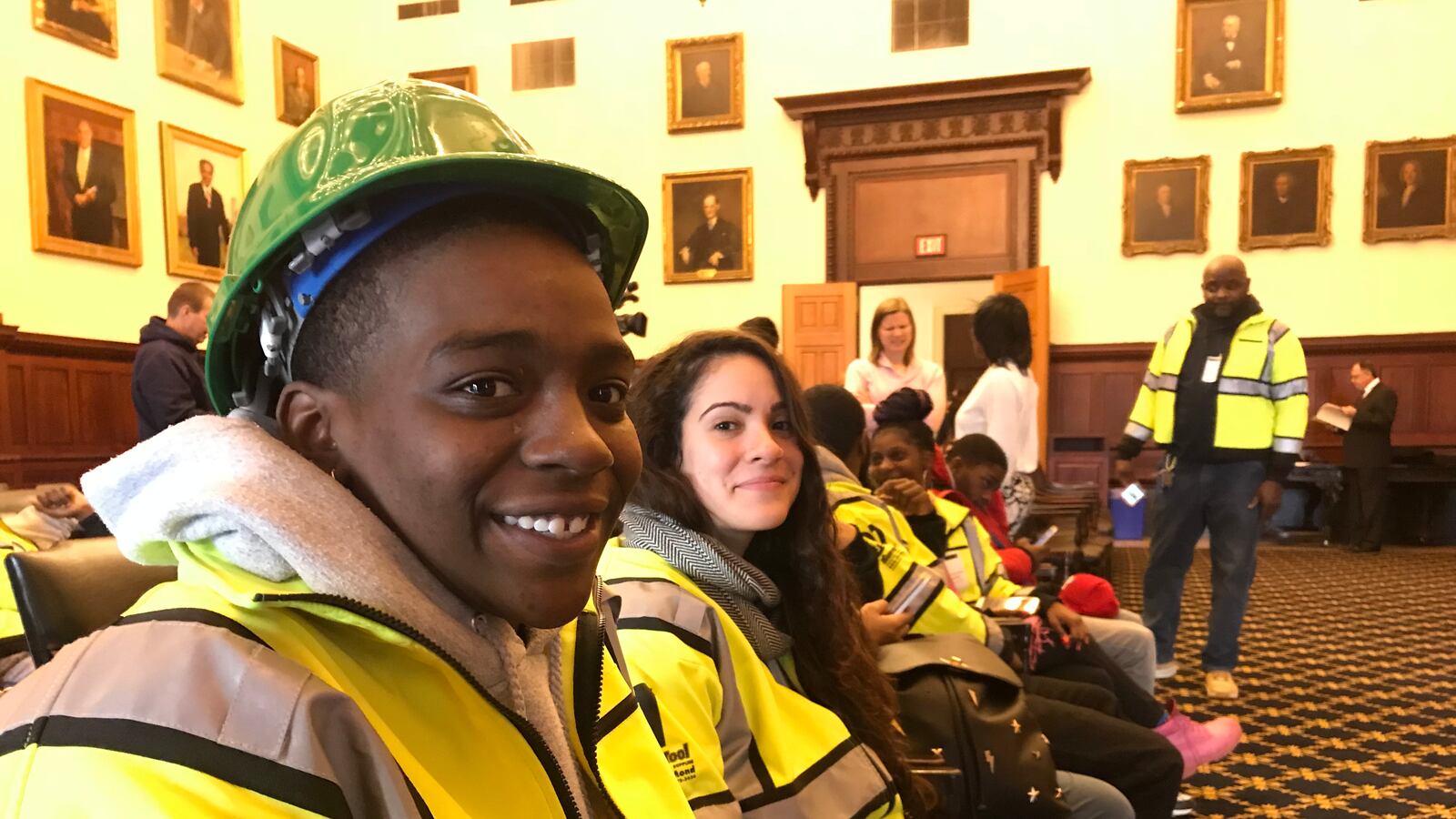This article was originally published in The Notebook. In August 2020, The Notebook became Chalkbeat Philadelphia.
In their yellow construction jackets and hard hats, the dozen or so students from YouthBuild Philadelphia Charter School made a great photo backdrop for Tuesday’s announcement that the city would spend $6 million in state welfare money to connect young people, ages 17 to 21, to job readiness programs and year-round employment.
“In my generation, there’s a lot of abandonment,” said Taryn Canty-Reid, 20, a YouthBuild student who dreams of being a carpenter. “I’ve been abandoned and I abandoned myself. I was always waiting for an opportunity to come to me instead of chasing opportunities.”
The money, funneled through the city’s workforce development board, will create opportunities for four groups of young people — those with autism and intellectual or developmental disabilities, those who have been involved with the criminal court system, those who have aged out of foster care, and graduates of Philadelphia’s career and technical education health-care programs.
For Canty-Reid, Tuesday’s press conference was a chance to meet the mayor. She also wanted to send a message to other young women interested in the male-dominated building trades: “You have to prove to them – and not only to them, but to ourselves – that this is our world and anything they can do, we can do.”
Canty-Reid never got a chance to speak, although she was prepared.
So was Mayor Kenney.
“We’re in a battle against poverty, which has kept a generation of young people in Philadelphia from achieving the life we want for them,” Kenney said during the news conference outlining the effort.
The program will identify and assist 1,000 young people who are already receiving some form of government support, adding a layer of workforce training to the help they already receive, said H. Patrick Clancy, president and chief executive of Philadelphia Works, the city’s workforce development agency.
Philadelphia School District Superintendent William Hite said, “When you make an investment in young adults, these young adults and youth never let us down.”
The move comes as the nation’s unemployment rate has fallen to 4.1 percent amid a tightening labor market, with employers unable to fill jobs.
Pennsylvania’s unemployment rate stood at 4.6 percent for November, the most recent month available for statewide statistics gathered by the U.S. Labor Department. In Philadelphia, November’s unemployment rate was well above national and state rates at 6.2 percent.
Typically, unemployment among young people and minorities runs higher, with rates skyrocketing for young people who have any kind of barrier.
For example, only one in two children moving out of foster care at age 18 has “meaningful employment” by age 24, said Cynthia Figueroa, commissioner of the Philadelphia Department of Human Services, at the press conference. Her agency works with youth in foster care.
The $6 million will be divided among nine organizations providing youth services, each responsible for recruiting young people, identifying specific needs of each group, developing training and connecting them with employers to develop paid work experiences in industry sectors expected to see job growth. The organizations will act as career counselors, and provide supports in legal services, financial literacy, and high-school equivalency completion, among other areas.
Patrick Eiding, a member of the Philadelphia Works board and the head of the Philadelphia AFL-CIO, the city’s largest organized labor union, said the aim of the program was not to duplicate services already provided. “This is a holistic approach,” he said.
JEVS Human Services received a $354,178 grant to provide services to young people with autism and intellectual or developmental disabilities. Receiving grants to assist adjudicated youth were Eckerd Connects, $453,288; JEVS, $609,269; and YouthBuild Philadelphia Charter School, $344,675.
Children’s Hospital of Philadelphia received $528,081 to develop programs for young people aging or aged out of foster care. Other providers in that group included Communities in Schools in Philadelphia, $637,500; JEVS, $300,000; Temple University’s Center for Social Policy and Community Development, $614,111; and Valley Youth House, $628,800.
Educational Data Systems Inc. landed a $629,847 grant to provide services to health-care graduates of the city’s career and technical schools. Philadelphia Youth Network received $552,500 to serve the same group, and Temple University’s College of Education was awarded $637,500.

